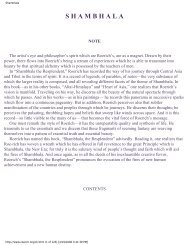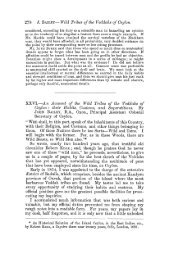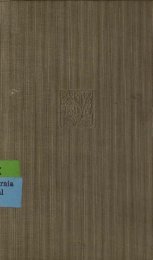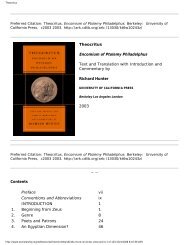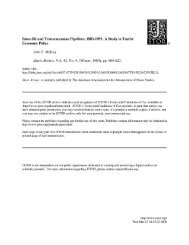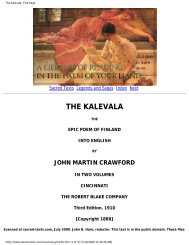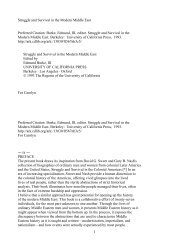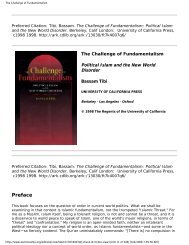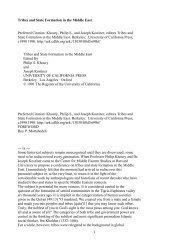Between Two Worlds Kafadar.pdf
Between Two Worlds Kafadar.pdf
Between Two Worlds Kafadar.pdf
You also want an ePaper? Increase the reach of your titles
YUMPU automatically turns print PDFs into web optimized ePapers that Google loves.
origins might well serve as a metaphor for all kinds of social ambiguities other<br />
than or in addition to an ethnic one, which has been the sole focus in<br />
literalist readings of historicist folklore.[63] That the soiled and the sacred,<br />
the two faces of what lies beyond the normal, are related to one another must be<br />
obvious to readers of Mary Douglas, the anthropologist, or of La dame aux<br />
camélias , the novel; hence the attributes of impurity and ambiguity can express<br />
sacredness embodied in a Digenis or in Danismend's companions. While the<br />
preceding interpretation of the frontier legends is not meant to provide the<br />
only or the most privileged reading, I would still maintain that the selection<br />
of ethnic fluidity as a meaningful and popular metaphor for social ambiguity in<br />
medieval Anatolia cannot have been totally arbitrary.<br />
In addition to the plasticity of identities in frontier environments, we must<br />
note the possibility of cooperative ventures by people of different identities<br />
at any given moment even if those identities may be seen to be engaged in a<br />
conflict in a larger setting. In fact, contrary to modem scholars' arguments as<br />
to the incompatibility of the gaza spirit and cooperation with or toleration of<br />
infidels, the congruity of these two allegedly disharmonious attitudes appears<br />
to be a topos in frontier literature which reveals an essential point concerning<br />
the gaza spirit: it is, among other things, an attempt to gain hearts and minds;<br />
it is always possible that the pure-hearted infidel will join your fold. He or<br />
she is not necessarily an enemy to the bitter end.<br />
Numerous examples of such collaboration — real or metaphorical or both — occur<br />
in gaza narratives. I have already mentioned the case of Köse Mihal and Osman as<br />
well as the one of Umur Beg and Kantakouzenos. Wittek, too, explicitly noted the<br />
possibility of cooperative under-<br />
― 83 ―<br />
takings, such as the one between a certain Nicetas the Greek and a Saladinus ca.<br />
1278 on the Carla coast.[64] Even in gazavatnames produced much more<br />
self-consciously and knowledgeably in later orthodox environments, to develop a<br />
friendly relation with an infidel was not frowned upon. In the gests of<br />
Hayreddin Pasa (Barbarossa), grand admiral of Suleyman the Magnificent, for<br />
instance, the gazi seaman captures a large number of Christian ships and their<br />
captains, including the renowned Captain Ferando. When he sees that the brave<br />
infidel is wounded, the pasha orders that "a building in the palace complex [of<br />
Algiers] be vacated and reserved for Ferando and that surgeons visit him and<br />
serve him all day" until he is cured.[65]<br />
A late-seventeenth-century novella of the Mediterranean corsairs shows how<br />
exigencies could render the transition from Christian-Muslim cooperation to the<br />
championing of Muslim faith abrupt yet relatively unproblematic[66] .The author<br />
tells us that he and some other Muslims were captured by Christian corsairs<br />
while traveling from Alexandria to Istanbul. In a most surprising narrative<br />
twist, the warden of the corsair ship turns out to be the protagonist of the<br />
story; he delivers the Muslims from captivity and leads them, along with some of<br />
his "infidel" shipmates, to glorious and gainful adventures on the seas. As a<br />
group, the Christian sailors, including the warden, are referred to as "dirty<br />
infidels"; the world is divided into "us" and "them" in a confrontational<br />
75




